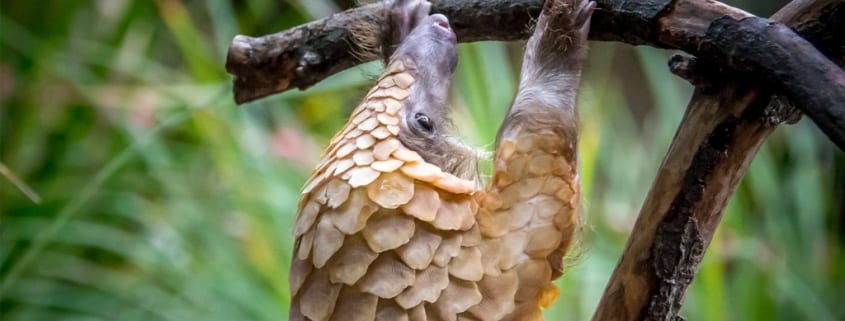Progressive Protection for Pangolins
What happens when the scaly armor that is supposed to protect pangolins leads to them becoming the most trafficked mammals in the world?
A shy pangolin has tough outer scales and curls into a tight ball when frightened– but these defenses are useless against threats such as poaching and habitat loss that are pushing the creatures closer to extinction.
All eight species of pangolin are illegally hunted because of the extremely high demand for their scales that are used in some traditional medicines, and for their meat. Today, all four of the Asian species – the Chinese, Sunda, Indian and Philippine – are listed as either Endangered or Critically Endangered by the International Union for Conservation of Nature (IUCN). The four African species – the White-bellied, Black-bellied, Giant Ground and Temminck’s Ground – are all listed as Vulnerable. Recently, Convention on International Trade in Endangered Species of Wild Fauna and Flora (CITES) delegates voted to ban all international commercial trade in pangolins.
While the CITES decision is mostly a symbolic action, it is helping to raise awareness about pangolins. Unfortunately, these unique creatures still face the threat of habitat loss and rely on protected areas for safety from illegal hunting. Pangolins have found refuge in a number of protected areas that Rainforest Trust supports, including current projects in India, Nepal, Cameroon and the Democratic Republic of the Congo (DRC).
Rainforest Trust is working with Applied Environmental Research Foundation in India’s North Western Ghats to protect critical habitat for Indian Pangolins. The new Prachitgad Community Reserve will prohibit unsustainable clearing of forest and hunting, providing a much-needed haven for the threatened pangolins.
In Nepal, Rainforest Trust is partnering with Red Panda Network to create a reserve that will help safeguard Critically Endangered Chinese Pangolins and other rare Himalayan species.
White-bellied Pangolins have a range that spans West and Central Africa and are found within the Douala-Edea Wildlife Reserve in Cameroon. Rainforest Trust is working with Cameroon Wildlife Conservation Society to elevate the protected status of the reserve to a national park while expanding it so that it will safeguard a total of 741,000 acres.
The proposed Balanga Forest Reserve that Rainforest Trust and Lukuru Wildlife Research Foundation are helping to establish in the DRC is home to White-bellied, Black-bellied and Giant Ground pangolins. This reserve in addition to the adjacent Lomami National Park will provide nearly 3.4 million acres of protected habitat – a massive area almost the size of Connecticut – that is necessary for the continued survival of vulnerable animals in the region such as pangolins.
“I was very lucky to see a Sunda Pangolin when I was in Borneo this past summer, and it was truly a moving experience witnessing a mother with a baby hanging onto it in one of the reserves Rainforest Trust helped establish,” said Rainforest Trust CEO Dr. Paul Salaman.
“This proves to us that despite the enormous pressure on the species, the protected area approach works – and we will continue to expand safe havens for pangolins across Africa and Asia.”
Take action and help protect these unique creatures: for the price of a pumpkin pie, you can help save an acre of habitat for pangolins.





